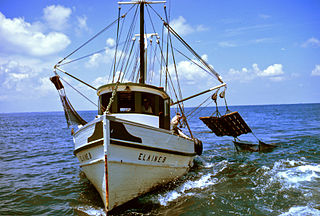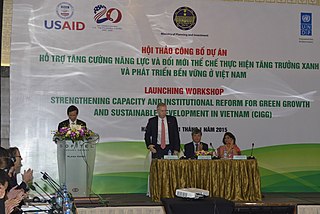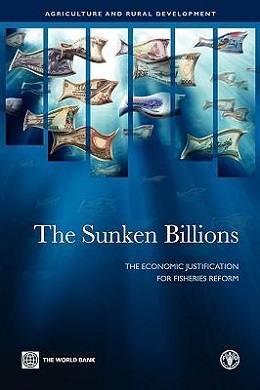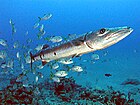Related Research Articles

Fishery can mean either the enterprise of raising or harvesting fish and other aquatic life or, more commonly, the site where such enterprise takes place. Commercial fisheries include wild fisheries and fish farms, both in freshwater waterbodies and the oceans. About 500 million people worldwide are economically dependent on fisheries. 171 million tonnes of fish were produced in 2016, but overfishing is an increasing problem, causing declines in some populations.

The Global Environment Facility (GEF) is a multilateral environmental fund that provides grants and blended finance for projects related to biodiversity, climate change, international waters, land degradation, persistent organic pollutants (POPs), mercury, sustainable forest management, food security, and sustainable cities in developing countries. It is the largest source of multilateral funding for biodiversity globally, and distributes more than $1 billion a year on average to address inter-related environmental challenges.

A conventional idea of a sustainable fishery is that it is one that is harvested at a sustainable rate, where the fish population does not decline over time because of fishing practices. Sustainability in fisheries combines theoretical disciplines, such as the population dynamics of fisheries, with practical strategies, such as avoiding overfishing through techniques such as individual fishing quotas, curtailing destructive and illegal fishing practices by lobbying for appropriate law and policy, setting up protected areas, restoring collapsed fisheries, incorporating all externalities involved in harvesting marine ecosystems into fishery economics, educating stakeholders and the wider public, and developing independent certification programs.

The fishing industry includes any industry or activity that takes, cultures, processes, preserves, stores, transports, markets or sells fish or fish products. It is defined by the Food and Agriculture Organization as including recreational, subsistence and commercial fishing, as well as the related harvesting, processing, and marketing sectors. The commercial activity is aimed at the delivery of fish and other seafood products for human consumption or as input factors in other industrial processes. The livelihood of over 500 million people in developing countries depends directly or indirectly on fisheries and aquaculture.

The goal of fisheries management is to produce sustainable biological, environmental and socioeconomic benefits from renewable aquatic resources. Wild fisheries are classified as renewable when the organisms of interest produce an annual biological surplus that with judicious management can be harvested without reducing future productivity. Fishery management employs activities that protect fishery resources so sustainable exploitation is possible, drawing on fisheries science and possibly including the precautionary principle.

Capacity building is the improvement in an individual's or organization's facility "to produce, perform or deploy". The terms capacity building and capacity development have often been used interchangeably, although a publication by OECD-DAC stated in 2006 that capacity development was the preferable term. Since the 1950s, international organizations, governments, non-governmental organizations (NGOs) and communities use the concept of capacity building as part of "social and economic development" in national and subnational plans. The United Nations Development Programme defines itself by "capacity development" in the sense of "'how UNDP works" to fulfill its mission. The UN system applies it in almost every sector, including several of the Sustainable Development Goals to be achieved by 2030. For example, the Sustainable Development Goal 17 advocates for enhanced international support for capacity building in developing countries to support national plans to implement the 2030 Agenda.
The Deutsche Gesellschaft für Internationale Zusammenarbeit (GIZ) GmbH, often simply shortened to GIZ, is the main German development agency. It is headquartered in Bonn and Eschborn and provides services in the field of international development cooperation and international education work. The organization's self-declared goal is to deliver effective solutions that offer people better prospects and sustainably improve their living conditions.
The Joint Ocean Commission Initiative is a bipartisan, collaborative group in the United States that aims to "accelerate the pace of change that results in meaningful ocean policy reform." The Joint Initiative was established by the members of two major U.S.-based oceans commissions: the Pew Oceans Commission and the United States Commission on Ocean Policy. It was originally co-chaired by former White House Chief of Staff Leon Panetta and former Chief of Naval Operations Admiral James D. Watkins, chairs of the Pew and U.S. Ocean Commissions, respectively. Currently, the Joint Initiative is led by a Leadership Council, which is co-chaired by Christine Todd Whitman, former EPA Administrator under President George W. Bush and former governor of New Jersey, and Norman Y. Mineta, Secretary of Commerce under President Bill Clinton and Secretary of Transportation under President George W. Bush.
Sustainability metrics and indices are measures of sustainability, and attempt to quantify beyond the generic concept. Though there are disagreements among those from different disciplines, these disciplines and international organizations have each offered measures or indicators of how to measure the concept.

The Sunken Billions is a study jointly published in 2008 by the World Bank and by the Food and Agriculture Organization of the United Nations (FAO). The report shows that the difference between the potential and actual net economic benefits from marine fisheries is about USD 50 billion per year or some USD 2 trillion over the last three decades.
Environmental governance (EG) consist of a system of laws, norms, rules, policies and practices that dictate how the board members of an environment related regulatory body should manage and oversee the affairs of any environment related regulatory body which is responsible for ensuring sustainability (sustainable development) and manage all human activities—political, social and economic. Environmental governance includes government, business and civil society, and emphasizes whole system management. To capture this diverse range of elements, environmental governance often employs alternative systems of governance, for example watershed-based management.

Fisheries are affected by climate change in many ways: marine aquatic ecosystems are being affected by rising ocean temperatures, ocean acidification and ocean deoxygenation, while freshwater ecosystems are being impacted by changes in water temperature, water flow, and fish habitat loss. These effects vary in the context of each fishery. Climate change is modifying fish distributions and the productivity of marine and freshwater species. Climate change is expected to lead to significant changes in the availability and trade of fish products. The geopolitical and economic consequences will be significant, especially for the countries most dependent on the sector. The biggest decreases in maximum catch potential can be expected in the tropics, mostly in the South Pacific regions.

The International Day of Forests was established on the 21st day of March, by resolution of the United Nations General Assembly on November 28, 2013. Each year, various events celebrate and raise awareness of the importance of all types of forests, and trees outside forests, for the benefit of current and future generations. Countries are encouraged to undertake efforts to organize local, national, and international activities involving forests and trees, such as tree planting campaigns, on International Day of Forests. The Secretariat of the United Nations Forum on Forests, in collaboration with the Food and Agriculture Organization, facilitates the implementation of such events in collaboration with governments, the Collaborative Partnership on Forests, and international, regional and subregional organizations. International Day of Forests was observed for the first time on March 21, 2013.
Sustainability standards and certifications are voluntary guidelines used by producers, manufacturers, traders, retailers, and service providers to demonstrate their commitment to good environmental, social, ethical, and food safety practices. There are over 400 such standards across the world.
Ocean governance is the conduct of the policy, actions and affairs regarding the world's oceans. Within governance, it incorporates the influence of non-state actors, i.e. stakeholders, NGOs and so forth, therefore the state is not the only acting power in policy making. However, ocean governance is complex because much of the ocean is a commons that is not ‘owned’ by any single person or nation/state. There is a belief more strongly in the US than other countries that the “invisible hand” is the best method to determine ocean governance factors. These include factors such as what resources we consume, what price we should pay for them, and how we should use them. The underlying reasoning behind this is the market has to have the desire in order to promote environmental protection, however this is rarely the case. This term is referred to as a market failure. Market failures and government failures are the leading causes of ocean governance complications. As a result, humankind has tended to overexploit marine resources, by treating them as shared resources while not taking equal and collective responsibilities in caring for them.

The International Institute for Sustainable Development (IISD) is an independent think tank founded in 1990 working to shape and inform international policy on sustainable development governance. The institute has three offices in Canada - Winnipeg, Ottawa, and Toronto, and one office in Geneva, Switzerland. It has over 150 staff and associates working in over 30 countries.
Multistakeholder governance is a practice of governance that employs bringing multiple stakeholders together to participate in dialogue, decision making, and implementation of responses to jointly perceived problems. The principle behind such a structure is that if enough input is provided by multiple types of actors involved in a question, the eventual consensual decision gains more legitimacy, and can be more effectively implemented than a traditional state-based response. While the evolution of multistakeholder governance is occurring principally at the international level, public-private partnerships (PPPs) are domestic analogues.

Blue economy is a term in economics relating to the exploitation, preservation and regeneration of the marine environment. Its scope of interpretation varies among organizations. However, the term is generally used in the scope of international development when describing a sustainable development approach to coastal resources. This can include a wide range of economic sectors, from the more conventional fisheries, aquaculture, maritime transport, coastal, marine and maritime tourism, or other traditional uses, to more emergent activities such as coastal renewable energy, marine ecosystem services, seabed mining, and bioprospecting.
Blue Justice is a critical approach examining how coastal communities and small-scale fisheries are affected by blue economy and "blue growth" initiatives undertaken by institutions and governments globally to promote sustainable ocean development. The blue economy is also rooted in the green economy and the UN Sustainable Development Goals. Blue Justice acknowledges the historical rights of small-scale fishing communities to marine and inland resources and coastal space; in some cases, communities have used these resources for thousands of years. Thus, as a concept, it seeks to investigate pressures on small-scale fisheries from other ocean uses promoted in blue economy and blue growth agendas, including industrial fisheries, coastal and marine tourism, aquaculture, and energy production, and how they may compromise the rights and the well-being of small-scale fisheries and their communities.
Sustainable Development Goals and Lebanon explains major contributions launched in Lebanon towards the advancement of the Sustainable Development Goals SDGs and the 2030 agenda.
References
- 1 2 Global Program on Fisheries (PROFISH) – World Bank.
- ↑ PROBLUE Annual Report 2019.
- ↑ WSSD's goals in fisheries Archived 2010-01-19 at the Wayback Machine
- 1 2 The Sunken Billions - The Economic Justification for Fisheries Reform Archived 2010-05-04 at the Library of Congress Web Archives – joint publication by the World Bank and the FAO

